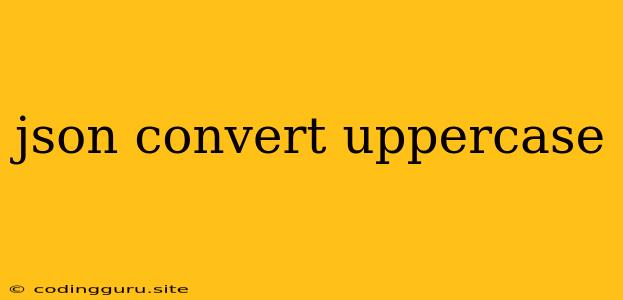Converting JSON Data to Uppercase: A Comprehensive Guide
JSON (JavaScript Object Notation) is a popular data format used for exchanging data between applications. It's known for its human-readable structure, which makes it easy to work with. However, you might encounter situations where you need to convert the data within a JSON object to uppercase. This could be for data consistency, display purposes, or other specific requirements.
In this guide, we'll explore various methods for converting JSON data to uppercase, covering different programming languages and common scenarios.
Why Convert JSON to Uppercase?
Here are some key reasons why you might want to convert JSON data to uppercase:
- Data Consistency: Ensuring uniformity in data representation, especially when combining data from different sources.
- Case-Sensitive Operations: For operations that rely on case-sensitive matching, converting data to uppercase can help avoid errors.
- Display Preferences: Displaying data in uppercase might be more visually appealing or align with specific design requirements.
- Database Integration: Some databases may require uppercase data for efficient querying or indexing.
Methods for JSON Uppercase Conversion
Let's delve into practical examples of how to convert JSON to uppercase in different programming languages and scenarios.
1. Python
Python's flexibility makes it an excellent choice for JSON manipulation. Here's a straightforward example using the json and string modules:
import json
import string
json_data = '{"name": "john doe", "city": "new york"}'
# Load JSON data
data = json.loads(json_data)
# Convert keys and values to uppercase
for key, value in data.items():
data[key.upper()] = str(value).upper()
del data[key]
# Convert back to JSON string
json_output = json.dumps(data)
print(json_output)
Output:
{"NAME": "JOHN DOE", "CITY": "NEW YORK"}
2. JavaScript
JavaScript, being the language of web development, is often used for processing JSON data. This example demonstrates using the JSON.parse and JSON.stringify methods:
const jsonData = '{"name": "jane doe", "country": "canada"}';
const parsedData = JSON.parse(jsonData);
// Convert keys and values to uppercase
for (const key in parsedData) {
parsedData[key.toUpperCase()] = parsedData[key].toUpperCase();
delete parsedData[key];
}
// Convert back to JSON string
const uppercaseJson = JSON.stringify(parsedData);
console.log(uppercaseJson);
Output:
{"NAME": "JANE DOE", "COUNTRY": "CANADA"}
3. Java
Java's strong typing system makes it suitable for handling JSON data with precision. Here's how to achieve uppercase conversion:
import org.json.JSONObject;
public class JsonUppercase {
public static void main(String[] args) {
String jsonString = "{\"name\": \"john doe\", \"state\": \"california\"}";
JSONObject jsonObject = new JSONObject(jsonString);
// Convert keys and values to uppercase
for (String key : jsonObject.keySet()) {
String value = jsonObject.getString(key);
jsonObject.put(key.toUpperCase(), value.toUpperCase());
jsonObject.remove(key);
}
System.out.println(jsonObject.toString());
}
}
Output:
{"NAME": "JOHN DOE", "STATE": "CALIFORNIA"}
4. PHP
PHP is often used for server-side scripting and handling JSON data. This code demonstrates uppercase conversion using PHP's built-in functions:
$jsonString = '{"name": "jane doe", "city": "london"}';
$jsonData = json_decode($jsonString, true);
// Convert keys and values to uppercase
foreach ($jsonData as $key => $value) {
$jsonData[strtoupper($key)] = strtoupper($value);
unset($jsonData[$key]);
}
// Convert back to JSON string
$uppercaseJson = json_encode($jsonData);
echo $uppercaseJson;
Output:
{"NAME": "JANE DOE", "CITY": "LONDON"}
Important Considerations
- Performance: For large JSON files, consider optimizing the conversion process to minimize performance impact.
- Data Types: Pay attention to data types within your JSON object. Some data types might not support direct uppercase conversion.
- Error Handling: Incorporate error handling to gracefully handle unexpected data formats or invalid JSON structures.
- Data Integrity: Double-check that uppercase conversion doesn't compromise the intended meaning or functionality of your data.
Conclusion
Converting JSON data to uppercase is a common task with diverse applications. The methods outlined in this guide provide you with practical examples for achieving this conversion in different programming languages. By understanding the reasons behind uppercase conversion and choosing the appropriate method for your context, you can effectively manage and manipulate your JSON data for various purposes.
